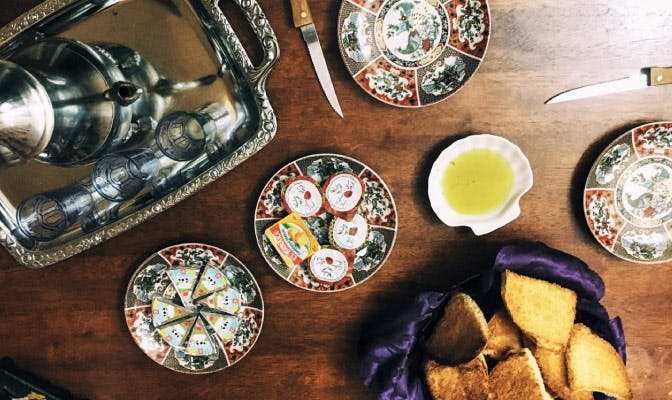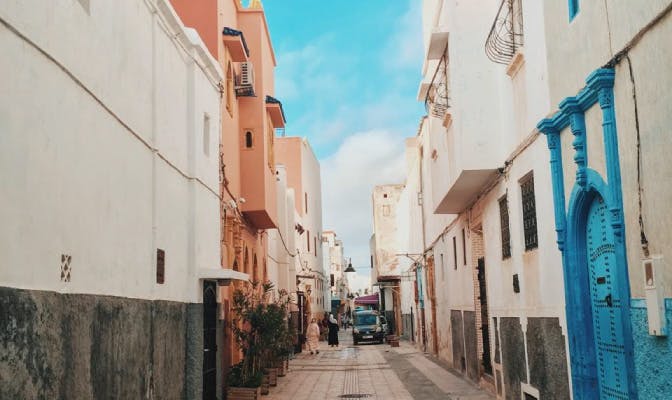
Are looking to volunteer in Morocco? Planning for a volunteer trip isn’t as easy as we’d all like, especially one in a foreign country. There’s no “Volunteering in Morocco for Dummies” to be purchased, no time for a new language to be perfected, and certainly not enough suitcase space for everything you’ve laid out to be packed. Fortunately for you, you’ve got a nagging curiosity to explore new parts of the world and a fiery desire to contribute to a meaningful cause along the way.
Enter my ‘how to volunteer in Morocco’ guide. I’ve taken everything I learned during my volunteer trip to Rabat, Morocco, and put together a personalized cheat sheet for anything and everything you could possibly need to know about volunteering in Morocco. Let’s get started!

Volunteer opportunities in Morocco
There are five meaningful projects that you can volunteer on, including Teaching English, Teaching French, Childcare, Women’s Education, Sports Development and a special project during the holy month of Ramadan. You can also volunteer in Marrakech while in Morocco with IVHQ.
Plan to work around 3 - 5 hours per day at your placement, though the times of your placement will depend on where you’re working. Volunteers working during Ramadan should expect to work shortened hours due to the holiday. You’re responsible for getting to and from your placement each day, and while some are under a five minute walk, others require the service of a street car or taxi.
Childcare volunteers should come equipped with lots of energy and patience. For teachers, coming into the classroom with a lesson plan will hugely benefit both you and your students. There’s nothing keeping childcare volunteers from squeezing in language practice, just as there’s nothing preventing teachers from incorporating fun activities into their lessons. The best placement hack I can offer: free your inner kid - the youngsters will appreciate it and you’ll have much better luck tailoring lessons to their interest (aka keeping them focused).
Something to consider: IVHQ offers language classes for a reasonable cost for those seeking an easier transition into Arabic or French. While I did not participate in the class, I do think it would benefit any volunteer hoping to make deeper connections with the people and kids at their placement.

What should I pack?
The only thing worse than overpacking in Morocco is packing culturally insensitive clothes. Do your research before arriving to ensure that the clothes you’re bringing are respectful and appropriate. Very rarely do you see women exposing their ankles, especially not in public. Men and women wear both western fashion and traditional Moroccan kaftans. Lucky for you - there’s affordable stores on every corner should you need to pick something up. As a general rule, I found the dress in Rabat to be much more modest than that in Marrakech. In terms of general packing, you should pack as you would for any other vacation. You’ll be provided with pillows and bedding, and your host family will happily assist you with your laundry.

What will my accommodation be like?
What really makes a new place feel like home? Family. And your homestay family is just that - a family away from home. They’ll be your go-to source for fun things to do around the city, and they’re always eager to help you improve your language skills. (Pro-tip: dinner time is the best time to practice! You can tell me ’shukran’ later). Expect your sleeping arrangements to be slightly different from what you’re used to at home. You’ll share a room with another volunteer, and that bed of yours might actually be a sofa in disguise - in fact, many Moroccans sleep on sofas (which traditionally are referred to as Sdaders) rather than beds! But worry not, they’re deceptively comfy. At your homestay, you’ll have access to all your normal western amenities: toilet, shower, fridge, washing machine, etc. And for volunteers coming during the summer, be prepared for the heat - AC in Morocco is an open window.

What is the food in Morocco like?
The food in Morocco is just as culturally vibrant as the country itself. Come to Morocco ready to dive into the delicious cuisine— and the different ways of consuming it! Spoiler: forks are optional here, in fact, most people prefer using their hands or bread as a spoon. Embrace it! A standard breakfast includes bread, jam/butter, and eggs. Mint tea is a breakfast staple, and warning, it’s the most incredible thing you’ll ever drink. Lunch and dinner often include tagine, couscous, salads, and lots of bread. There’s hundreds of delicious food carts and restaurants within walking distance should you want to meet friends for a meal. For vegetarians, your family will be beyond accommodating - I had no problem whatsoever. Mealtimes can be quite different from what you’re used to at home: A typical meal schedule would be breakfast at 10, lunch at 3, and dinner at 9.
For volunteers working during Ramadan , you will be fasting from Suhur (around 3:30 am) until Iftar (around 7:45 pm). While food and drink are prohibited during the fasting times, night time is filled with what seems like every food imaginable. The nightly Iftar feast is practically a five star buffet where you can quench your hunger and thirst. I highly recommend volunteering during Ramadan for both Muslims and non-Muslims if you’re able. For those volunteers who are on the edge about fasting, go for it! If you decide fasting isn’t for you, your family will be understanding and likely leave food out for you during the day. A few restaurants near the Rabat train station remain open for people who are not fasting. There are also many food vendors who begin their sales early before the fast is over. That being said, it is your responsibility to ensure that you respect the Ramadan culture and those fasting by eating in private.

How do I get around?
You’ll often find the best (and cheapest) transportation method is your own two legs. Most places in Rabat are completely walkable, and trekking around is a great way to burn off that third helping of tagine you had the night before. If walking isn’t your style, taxis are very affordable, but make sure they‘ve turned on their meter before pulling away or else you’ll be paying more than you bargained for. The city tram in Rabat is another great public transportation option. For longer distances, the train is a fantastic choice. I recommend the first class cabins for extra room and privacy, all for a fraction more of the second-class ticket cost.

What is there to see in Morocco?
One of the best parts of volunteering in Morocco is the abundance of things to do and see. For volunteers in Rabat, you can spend many afternoons exploring the medina, both shopping and tasting the street food. The beach is not to be missed, as the crashing waves and cliffs makes for a great photo opp. Your weekends are your free time, and lucky for you, there’s no shortage of things to do. Many volunteers flock in groups to Fes, Chefchaouen (the ‘blue city’), Tangier, Marrakech, or Casablanca during their weekends. There are many overnight Sahara Desert trips that leave from Marrakech (camel rides included!) that any adventure goer should squeeze into their itinerary. Spain is an easy 45 minute ferry ride from Tangier, making a quick Europe trip practical for anyone looking to see another country.

Quick tips for volunteering in Morocco:
Phone: Many volunteers opt to buy a SIM card upon arriving at the airport. You simply reload the cards as you use up minutes and data at convenience stores, making it a super affordable way to keep in touch with family and friends at home. Pro tip: if you’re planning on buying a SIM card, make sure your phone is ‘unlocked’, otherwise, the SIM will not work.
Wifi: All homestays are equipped with WIFI, although the service can be quite spotty and somewhat slow. But fear not, you’ll totally be able to post that cool Instagram photo with a little patience.
Money: Check the conversion ratio before arriving. Oftentimes, the airport currency exchange counters are more expensive than the ones in Rabat. Currency exchange centers and ATM’s are not scarce in Morocco, and many stores accept credit cards. Top tip: bring backup cash or cards!
Water: Tap water is great for washing your hands, but not so much for drinking. It’s very common for tourists to get sick from the water in Morocco. Avoid this by bringing money to buy bottled water - 40 Dirham should be more than enough supply for the week. Also, in the off case that you do get sick, travel doctors can prescribe super effective traveler’s diarrhea medicine for you, pre-departure.

Safety: While Morocco is by all means a safe place, use common sense and keep a hand on your belongings at all times. Also, as in any country, make sure you use the buddy system during any night travel simply as a precaution.
Culture: As I mentioned before, what goes clothing-wise is probably a lot different than where you live. Shorts are fine for guys, but not for women. Ladies, it’s not necessary to wear head coverings, but bringing a scarf to have on hand is a good idea. Also, alcohol consumption is strongly frowned upon, so be respectful when making your nightly plans and leave booze out of them.
Staff and Volunteers: A member of IVHQ staff will always be available to assist you, whether it’s picking you up from the train station or suggesting a great place to eat. The local coordinators in Morocco are beyond incredible. You’ll be so appreciative of their kindhearted spirit as they restlessly work to make you feel as comfortable as possible. Expect to be blown away by the quick friendships you’ll form with the other volunteers and their lasting strength into the future.
Flights: Do your research to score some huge savings on flights. If your placement is in Rabat, it might actually be a lot cheaper to fly into Casablanca or Marrakech and take a train to Rabat. Similarly, arriving a day early and spending an extra 25 Dirham for early homestay accommodation might actually be your cheapest option.

Packing List
- appropriate clothes
- a jacket
- toiletries
- a towel
- first aid and medicine supplies
- comfortable shoes
- spending money
- a good book
- a laptop/notebook for journaling
- travel plug adapter
- travel lock for weekend travel
- an open mind
- a wildly eager spirit
Optional
- snacks
- sleeping bag/pillow (if you’re picky about that stuff)
- waiting until you arrive to purchase supplies for your placement
- gift for your homestay family (again, something you can purchase while you’re in morocco)
- bigger pants (haha…)
Well what are you waiting for? There’s a world of enchanting culture and breathtaking sights awaiting you here in Morocco. There’s lessons to be learned from the people and personal discoveries to be made each day. You’re coming to Morocco to do and see something far bigger than yourself, and you’ll find nothing short of that. In Morocco, the adventure never ends. So if you’re looking for a sign, this is it.


